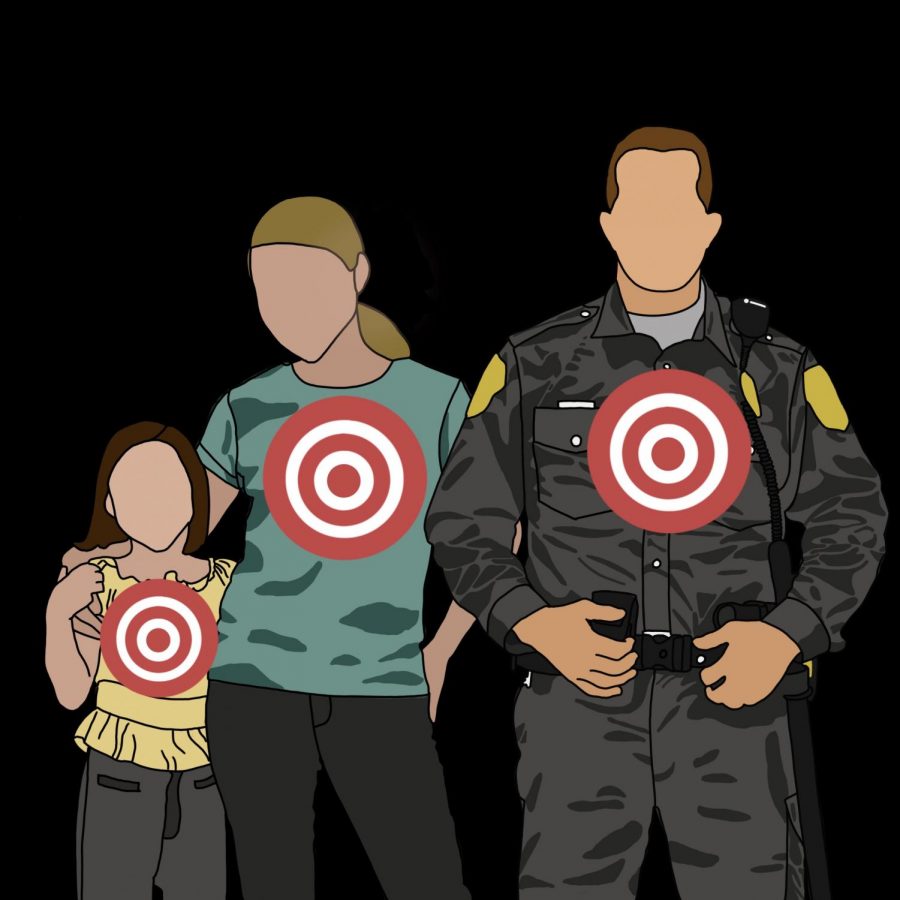The Lives of Those With and Without a Badge
Protests throughout cities and constant threats on social media are placing targets on family members of police officers. The threats are expanding as the issue is drawing more attention through the news and the media.
Due to the growing racial tensions in America, many police families have become a major target. “We have taken more safety precautions and are keeping on the lookout,” senior Mckenzie Oakes said.
The job is never the same. What the day may consist of is always a question. Officers do not know what they will see, and their families never know what to expect. It is a consistent thought in the back of loved ones’ heads if they will return home from work and remain safe throughout the day.
The job of a police officer takes focus, concentration, and a clear mind to shake off hate speeches and middle fingers thrown at them. Police work used to be one of the most dignified and proud jobs one could have; however, recent events have taken a negative toll on police officers’ jobs while also affecting their families’ lives. The families of police officers have been under siege for years–, and more specifically, the last few months– with so many people in the streets demanding the police be abolished and screaming their hate toward the job. The families are unable to respond because they will easily become the next target, so they are forced to sit back and watch the hate be thrown toward them and their families.
Throughout the months of protests, both peaceful and not peaceful, a job in law enforcement has become one of the hardest to pursue. There have been recent protests in towns within close proximity–, including Kenosha, Wisconsin, that have affected Antioch’s community directly.
“The threatened unrest that was targeted for the town the night after the shooting in Kenosha was very stressful,” Officer Paul Klem said. “All personnel reported for duty that night and tensions were very high because of the unknown.”
The police department in the community and Officer Klem were working to protect everyone that lived in it. The community as a whole was shaken, however, the lives of those at home with law enforcement in their family were scared for another reason.
“The first night that the riots got really bad, my dad had to go into work. We all gave him a hug before he left and told him that we loved him. That was the scariest moment that my mom, siblings and I had gone through,” sophomore Desirae Wittig-Gildea said. “Nothing has been the same at home. Everyone is so much more on edge. We have had to remove our blue lights outside because we were scared.”
Witting-Gildea has always been proud to be a part of a police family. She has always been filled with jubilation, knowing her father is executing a hero’s job every day. To the students at Antioch who have parents in law enforcement, they do not think of them being the heroes that other people look to for help. They often think that they are ordinary parents until they put on the uniform and go to work. Recently, Witting-Gildea has put a hold on showing off the blue love as social media has been affecting her family household. Nobody will be able to understand how police families handle all the hate that comes their way: the constant disrespect from the public, the phones always out, recording every incident, the politicians and news reporters looking for coverage and then, there are the kids wondering if mom or dad are all right.
“During this time I had to delete all social media because I was getting so much hate,” Witting-Gildea said. “I did not want anyone to come after my family. I have been contacted on all social media platforms and at my personal phone number with people saying hate things about my father.”
Household lives have changed drastically as those of law enforcement now have to be careful of every word they speak. The job is not a topic most like to talk about and it has become sensitive to the public. The sensitivity has been causing threats to police officers and their families.
“All the racial tensions have definitely changed the view of our family and we took precautions on how to deal with a cop in the family,” senior Mackenzie Oakes said. “We have taken more safety precautions and are keeping on the lookout, making sure we put the police car in the garage and being ready at all times for anything to happen, just so that we are all safe.”
There are a lot of assumptions made about these families. Often it is said that they have it all and are not aware of other people. People believe they have it all because they constantly have someone at home who can protect them. They have been called invincible and privileged by others because of this.
“We are constantly filled with fear, and most of the time afraid to even tell people that we belong to a police family,” Witting-Gildea said.
The fear that surrounds police families is because as soon as people find out they belong to a police family, they become associated with the stigma of hatred that surrounds the job. They are putting their lives at just as much risk as their law enforcement families.
“I do feel like a target when police officers get brought up,” Witting-Gildea said. “Not being able to speak up feels awful. Nowadays, citizens are so angry and against police that if you voice your opinion, you get attacked. Everyone else tells you you’re wrong and you receive a long list of insults and lectures that make you wish you never spoke up in the first place.”
Besides being a physical target, are susceptible to the global arising of mental health problems. One of the most common things people do not know about police officers is that they are the first ones on the scene. Officers see the exact crime scene as it happens. It is not tampered with and is different from what people see on T.V. They experience this every day of the job and they can not change what they have seen. They have to put a bulletproof vest on before they go to work, which implies they have a chance of being shot. All of these things weigh heavily on the psyche, and over time, they can hurt the officers mentally.
“I’m often scared about my own mental health when thinking about family members that have this job;, however, I am beyond scared of how these current events will affect my father,” Witting-Gildea said. “My father has stopped talking about work and for the most part he keeps to himself. He’s just as scared as anyone else when he puts the uniform on and I’m afraid he will bottle up too much.”
According to American Broadcasting Company News, in 2019, 228 current or former officers died by suicide. This is because they often hide how they feel and can not express what they have been through.
“It is sad, but I try not to think about it a lot because I would never want that to happen to anyone in law enforcement,” Oakes said. “I try to support my family in every way possible.”
The suicide rates are going to continue climbing , mainly because of social media, says ABC news. Social media is said to spread the news of something happening n less than two minutes Although this keeps the world informed, there are times when the first reported facts are wrong. This is what leads to the misconception that police officers try to get people involved in bad situations and that they only care about themselves.
“I wish everyone would realize we are here to do a job and do not seek out incidents that would or could make the news,” Officer Klem said. “At the end of the day I would like everyone to be able to go home.”
With the job becoming more and more political, it has been harder for police officers’ voices to be heard. With the fast– reporting media and constant news updates in the world, their side of the story and what they personally experienced is skipped over.
“Not all the news is being reported, and depending on your prior views or ‘likes’, social media could be fueling the side you already believe,” Klem said. “Since you are not getting the whole story, someone’s opinions can be extreme. We must all remember social media does not always accurately portray reality.”
As the jobs of police officers change, so do the lives of their loved ones at home. While they are out protecting their community, there is nobody at home protecting their families from the hate they see and hear every day.





